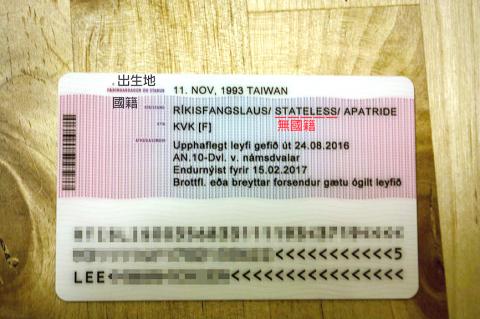A Taiwanese exchange student in Iceland yesterday reported that the nationality on her residency permit had been changed to “stateless” after she appealed against being classified as “Chinese.”
“Even though I’m only on a half-year exchange, having ‘Chinese’ written on my ID card made me uncomfortable, because I identify with Taiwan as my country of citizenship,” a female student studying at the Reykjavik University, identified only by her surname Lee (李), wrote on “台灣人在歐洲 Taiwanese in Europe” Facebook group.
The 23-year-old School of Law student said she carried her passport to avoid using the permit.

Photo provided by Lee
A series of e-mails to Iceland’s immigration agency explaining the difference between Taiwan (Republic of China) and China (People’s Republic of China) elicited no reply, she said, adding that she only started to receive responses after she brought up the issue when she applied in person for a work permit.
“The woman at the window looked at me apologetically and said she was surprised that there would be this kind of problem, but her supervisor had said that because Taiwan was not a recognized country, there was nothing he could do,” Lee said.
However, after three months of contacting different government bureaus and the Taipei Representative Office in Denmark, she finally received a new ID card, which listed her nationality as “stateless.”
“At that moment, I wasn’t sure whether to be happy or cry,” Lee said, adding that her place of birth on the card was changed from “Kaohsiung” to “Taiwan.”
“This probably barely counts as half of a success, because ‘stateless’ at least shows that they acknowledge my statement that Taiwan isn’t Chinese territory,” she said.
Lee said her experience should be a warning about the nation’s weakening international status, adding that she was tired of having to apologize for not being “Chinese.”
“Why do I always have to say sorry?” she said.
“I’m not sorry that I’m not Chinese and I would like to never see any Taiwanese apologizing for being Taiwanese ever again,” she said.
“While Taiwan may think of itself as a normally operating country, as soon as we go abroad, who pays attention to us? No one recognizes us, our overseas representatives don’t have the standing to speak up, and no one listens,” she said.
“People who have not gone abroad don’t have to face this and might not realize the importance of the nation’s official name, and the reality that we’re becoming more and more disadvantaged internationally. Dragging out the ‘maintenance of the status quo isn’t really a good thing,” Lee wrote.
The Ministry of Foreign Affairs said that as the nation does not have a representative office in Iceland, all affairs there are handled by the Taipei Representative Office in Denmark, which has been instructed to offer assistance to the student.
Additional reporting by staff writer

‘FORM OF PROTEST’: The German Institute Taipei said it was ‘shocked’ to see Nazi symbolism used in connection with political aims as it condemned the incident Sung Chien-liang (宋建樑), who led efforts to recall Democratic Progressive Party (DPP) Legislator Lee Kun-cheng (李坤城), was released on bail of NT$80,000 yesterday amid an outcry over a Nazi armband he wore to questioning the night before. Sung arrived at the New Taipei City District Prosecutors’ Office for questioning in a recall petition forgery case on Tuesday night wearing a red armband bearing a swastika, carrying a copy of Adolf Hitler’s Mein Kampf and giving a Nazi salute. Sung left the building at 1:15am without the armband and apparently covering the book with a coat. This is a serious international scandal and Chinese

SECURITY: As China is ‘reshaping’ Hong Kong’s population, Taiwan must raise the eligibility threshold for applications from Hong Kongers, Chiu Chui-cheng said When Hong Kong and Macau citizens apply for residency in Taiwan, it would be under a new category that includes a “national security observation period,” Mainland Affairs Council (MAC) Minister Chiu Chui-cheng (邱垂正) said yesterday. President William Lai (賴清德) on March 13 announced 17 strategies to counter China’s aggression toward Taiwan, including incorporating national security considerations into the review process for residency applications from Hong Kong and Macau citizens. The situation in Hong Kong is constantly changing, Chiu said to media yesterday on the sidelines of the Taipei Technology Run hosted by the Taipei Neihu Technology Park Development Association. With

A US Marine Corps regiment equipped with Naval Strike Missiles (NSM) is set to participate in the upcoming Balikatan 25 exercise in the Luzon Strait, marking the system’s first-ever deployment in the Philippines. US and Philippine officials have separately confirmed that the Navy Marine Expeditionary Ship Interdiction System (NMESIS) — the mobile launch platform for the Naval Strike Missile — would take part in the joint exercise. The missiles are being deployed to “a strategic first island chain chokepoint” in the waters between Taiwan proper and the Philippines, US-based Naval News reported. “The Luzon Strait and Bashi Channel represent a critical access

COUNTERINTELLIGENCE TRAINING: The ministry said 87.5 percent of the apprehended Chinese agents were reported by service members they tried to lure into becoming spies Taiwanese organized crime, illegal money lenders, temples and civic groups are complicit in Beijing’s infiltration of the armed forces, the Ministry of National Defense (MND) said in a report yesterday. Retired service members who had been turned to Beijing’s cause mainly relied on those channels to infiltrate the Taiwanese military, according to the report to be submitted to lawmakers ahead of tomorrow’s hearing on Chinese espionage in the military. Chinese intelligence typically used blackmail, Internet-based communications, bribery or debts to loan sharks to leverage active service personnel to do its bidding, it said. China’s main goals are to collect intelligence, and develop a